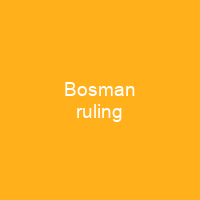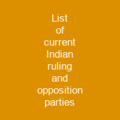Jean-Marc Bosman was a player for RFC Liège in the Belgian First Division in Belgium whose contract had expired in 1990. Bosman’s wages were reduced as he was no longer a first-team player. He took his case to the European Court of Justice in Luxembourg and sued for restraint of trade.
About Bosman ruling in brief

Mr Bosman, as has been pointed out by the Danish Government and Advocate General in points 209 and 210 of his Opinion, is likely to be affected by the rules likely to restrict the freedom of movement of players, even after the expiry of contracts with those clubs. Since they provide 100 per cent that a professional footballer not pursue his activity with a new club established in another Member State unless it has agreed upon a transfer fees or determined in accordance with the sporting regulations of the two clubs, the rules may be an obstacle to his freedom to move. As the national court has rightly pointed out that the transfer rules may not affect the relationship between clubs, it may be found that the rules are not affected by that finding, as the court rightly said that the business relationship between the clubs is not affected. The Court has also stated, in Case 8187 The Queen v HM Treasury and Commissioners of Inland Revenue ex parte Daily Mail and General Trust plc ECR 5483, paragraph 16, that even though the Treaty provisions relating to freedom of establishment are directed mainly to ensuring that foreign nationals and companies are treated in the host Member State in the same way as nationals of that State, they also prohibit the Member State of origin from hindering the establishment.
You want to know more about Bosman ruling?
This page is based on the article Bosman ruling published in Wikipedia (as of Dec. 24, 2020) and was automatically summarized using artificial intelligence.







